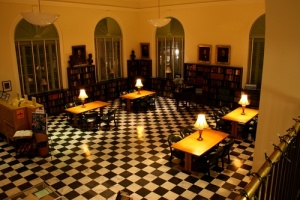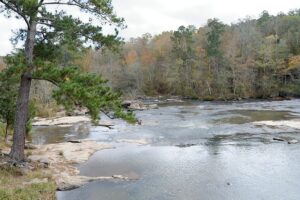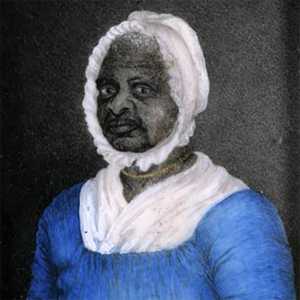Americanism Redux
January 12, 250 years ago today, in 1773
“All in favor say ‘aye’.”
The hands raised up. “One”, “two”, “three”, and on it went. The count was finished but the outcome was never in doubt. The group wanted to do it. Excited. Motivated. Resolved.
Today, in the British colonial capital of South Carolina, the Charleston Library Society approves the plan to “to establish a museum.” It will be the first of its kind in the British colonies, offering a wider array of items on display than that available in Philadelphia with the American Philosophical Society’s three-year old natural history museum.
For the people of Charleston, it’s a proud moment for a proud community.
(interior of today’s Charleston Library Society)
Across town in Charleston, Andrew Rutledge announces he will begin accepting students who want to learn dance. So, if you’re wealthy enough to pay the fees, and have white skin of course, you’ll soon be able to learn dance in the morning and stroll through the museum in the afternoon. It’ll be a full day, sometime, after the public building is up and open. 250 years ago today, with the unanimous vote of approval, the stake is in the ground.
On this day, other stakes could soon go in the ground, too. Hundreds of Cherokee families along the Savannah River valley are nervous. British imperial officials and colonial land-buyers from the Georgia and South Carolina coasts pressure them to sell two million acres of land. Leaders of the Cherokee tribes, male and female alike, don’t see a clear path out of their difficulties in rejecting the whites’ offers. The Cherokee have suffered greatly in wars fought ten, fifteen, twenty years ago. Despite their skill in farming and production of clothing, tools, and craftware, they’ve struggled to regain the prosperity lost in wartime. The land is their basis of life. Tensions are high over who will hold the land, the Natives of the interior or the British and their colonists of the coast.
(the Broad River in Georgia)
The colonists along the Georgia and South Carolina coast are only now getting northern news of early December and late November. It’s a four to seven-week lag of the ships from Boston, New York, Philadelphia. So it will be spring and the magnolia blossoms open that they’ll hear of news from the north that could upend their world, and then upend the upend.
Also
That news is happening now in Sheffield, Massachusetts, today, 250 years ago. Located in the western regions of the British colony, the town is near the tallest mountain in the north, where the weather changes from serene to ferocious in minutes. Today, a town meeting in Sheffield has resulted in a powerful set of Resolves that proclaim the pro-colonial cause. The language in the document blasts like the winds off that mountain peak–“mankind in a state of nature are equal, free, and independent,” “God and nature have made us free,” “Americans in general…are entitled to all the liberties, privileges, and immunities of natural born British subjects,” and on and on. Samuel Adams couldn’t have stated it any better.
A black woman enslaved by one of the Sheffield Resolve-writers heard these words from the mountaintop. She is Mum Bet, approximately thirty years old, a mother of one child, and proud, defiant displayer of one of her arms with a nasty burn and scar. The enslaver’s wife had hit her with a red-hot shovel and Mum always showed her arm as a symbol of her individual form of independence. She was her own museum.
Mum can’t read but she hears today about those Sheffield Resolves written by the white folks in the big meeting. As far as she’s concerned, they’re talking and writing about her as much as them. That’s how it is and how it’s going to be. The more she thinks about, the more she riles up. Forget that hot shovel. It’s ice compared to Mum; she’s boiling mad that they get to have those Resolves and then say she can’t have them. Hell with that: she’s in nature, like them; she’s rightful free, like them; she’s all herself inside and wants the outside to know it, too, like them. She’ll think about this a whole lot more and then do something about it. You don’t want Mum pissed off, not if you’re them.
(Mum Bet, later in life, as Elizabeth Freeman–the last name is purposeful)
For You Now
A cause that is about all of life is a cause that will take all of life in, its happiness and cruelty, its angels and demons. Today 250 years ago the scope of the sweep brings breathtaking visions of what should be and throat-choking bones of mistakes and ill-will. In the interior of what is now Georgia, human energy rises in temperature, ready to explode against human settlement. Along the coast of South Carolina a desire for a community to know itself bursts into form and shape with a selection of all hands raised. And from their perspective an event from the other-world, located away in space and somehow further away in time, which promises to rain manna and split the earth simultaneously.
This amalgam of good and evil or, if you prefer, the light and the dark will appear to become more than people can navigate. Yet each day, like today 250 years ago, people will be faced with the choice of finding a door to open, a window to close, a step to take. One by one, one at a time, one after the other.
Suggestion
Consider those moments when you need to interject, to insert, more time than you seem to be given. The device in your hand or in your pocket can be forced, by you, to wait. It was a burden then to be six weeks behind or six weeks ahead. Maybe there’s a gain to crafting a tiny version of your inner six weeks. Mum knows.
(find moments to reinsert time–you’ll need that as we approach the semiquincentennials)











